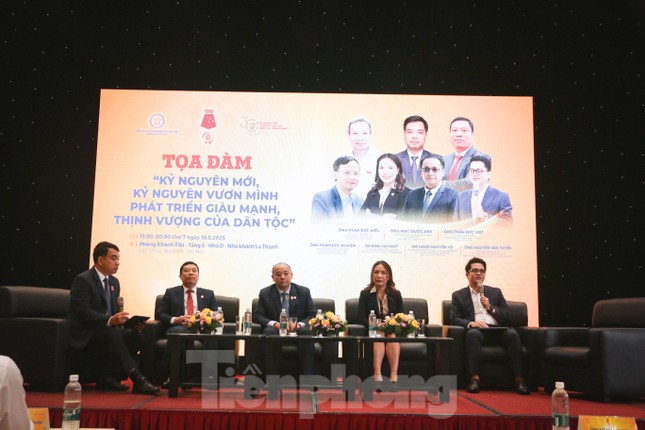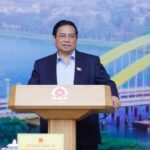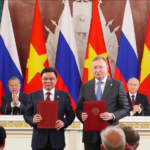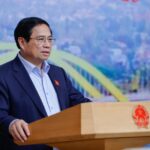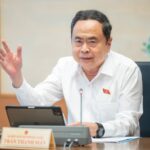At the discussion titled “A New Era: An Era of Soaring Development, Prosperity, and Strength for the Nation,” held by the Hanoi Small and Medium Enterprise Association (HANOISME) on May 10th, National Assembly Deputy Phan Duc Hieu shared a perspective that resonated with many experts in attendance.
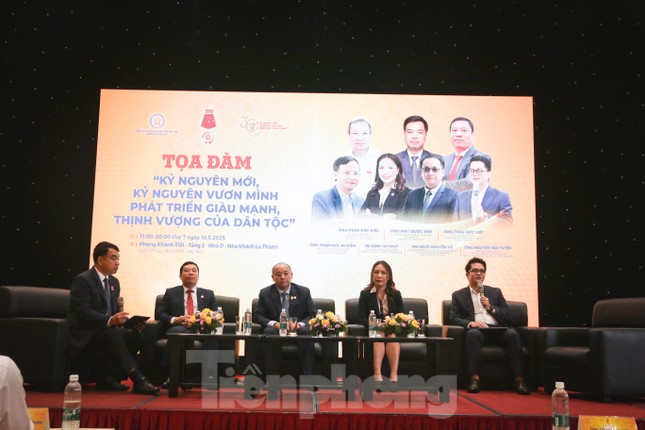
A glimpse of the insightful discussion, “A New Era: An Era of Soaring Development, Prosperity, and Strength for the Nation.”
Mr. Mac Quoc Anh, Vice President of HANOISME, emphasized that the Fourth Industrial Revolution, with its AI, blockchain, big data, IoT, and additive manufacturing technologies, is redefining value creation. Vietnam has emerged as a hub for software outsourcing, semiconductors, and IT services, attracting giants like NVIDIA, Samsung, Foxconn, and Amkor. The opportunity to make a leapfrog development move has never been more apparent.
Additionally, the shift in supply chains due to geopolitical tensions and the trends of “China plus one” and “Vietnam plus one” have positioned Vietnam as a destination for major investors from Japan, the US, and the EU. Foreign direct investment is expected to reach 40-45 billion USD annually in the 2025-2030 period, fostering a linkage between production, services, and innovation.
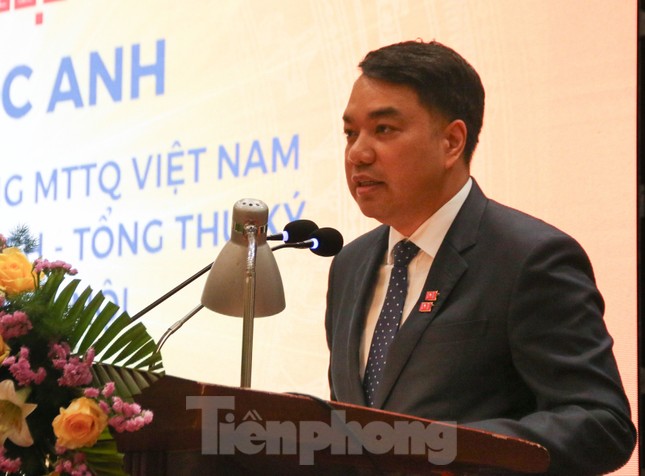
Mr. Mac Quoc Anh, Vice President of HANOISME, sharing his insights.
Furthermore, the shift in supply chains due to geopolitical tensions and the trends of “China plus one” and “Vietnam plus one” have elevated Vietnam as a destination for major investors from Japan, the US, and the EU. With expected FDI inflows of 40-45 billion USD annually during 2025-2030, a vibrant ecosystem of production, services, and innovation is set to flourish.
In this evolving context, especially with the reformist spirit of Resolution No. 68-NQ/TW of the Politburo on private economic development, Hanoi, with its over 400,000 businesses and vibrant startup community, has a city-level innovation hub that has been making strides in adaptation and progress. The city has been a hotspot for innovative endeavors.
Mr. Phan Duc Hieu, a member of the National Assembly’s Economic Committee, asserted that Vietnamese businesses, particularly those in the capital, are undergoing continuous development. The implementation of Resolution 68 in 2025 will mark a qualitative turning point. The resolution’s essence lies in providing solutions to reduce red tape, enhance protection for businesses venturing into the market, and unlock resources.
“Businesses are most concerned about the strong execution of this resolution, which will determine its success,” Mr. Hieu remarked. “While a more open institutional environment will intensify competition and heighten the risk of elimination, it also presents an opportunity for ambitious enterprises to surge ahead.”
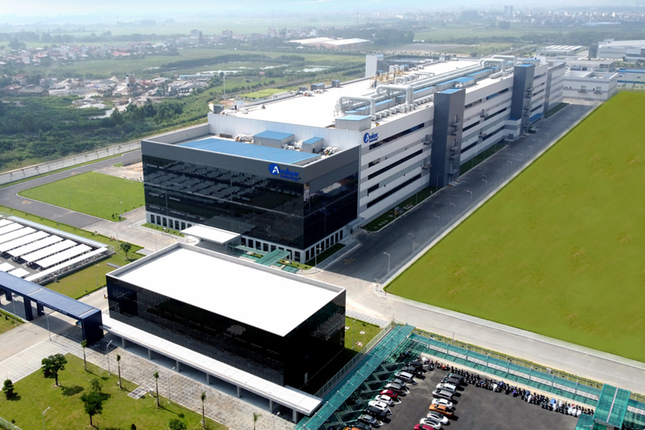
A glimpse inside Amkor Technology’s semiconductor factory in Yen Phong Industrial Park, Bac Ninh. Image source: VnEconomy.
Emphasizing economic self-reliance through innovation, Mr. Pham Duc Nghiem, Deputy Director of the Market Development and Enterprise Department, Ministry of Science and Technology, highlighted that digital transformation is a critical pillar and a significant opportunity for Vietnamese businesses today. For enterprises aiming to transition from traditional to modern management models, digital transformation is a prerequisite.
“The Ministry of Science and Technology is developing programs to promote and leverage digital resources to support businesses. A successful digital transformation can boost productivity and efficiency by up to 30%. With Resolution 68, we need to proactively outline our requirements. The Ministry is committed to fostering innovation and providing encouragement and support for small and medium-sized enterprises in the coming years, walking hand in hand with businesses to materialize innovation-driving activities,” Mr. Nghiem assured.
“Vietnam’s High-Speed Revolution: 2,268 km of Expressways and Counting”
“On the morning of May 10, Prime Minister Pham Minh Chinh, head of the National Steering Committee for important projects and key national transport infrastructure projects, chaired the committee’s 17th meeting. As per the meeting’s updates, Vietnam now boasts an impressive 2,268 kilometers of expressway network.”
The Road to a Streamlined System: Refining the Organizational Structure of 34 Provinces Post-Merger
“In a recent proposal on provincial administrative unit arrangements for 2025, the Ministry of Home Affairs presented a comprehensive plan. This plan involves streamlining organizational structures and strategically rearranging personnel, including officials and civil servants. This strategic move aims to enhance efficiency and effectiveness within the provincial administrative units across the nation.”
The Long Thanh Airport: Awakened from its Slumber
As of now, the country has successfully constructed 2,268 kilometers of expressways, and an additional 800 kilometers are expected to be completed by the end of the year. Notably, the Long Thanh International Airport project has come to life after years of dormancy, and the road connecting it is being actively developed.
The Speaker: In Many Places, Only a Change in Party Secretary or Chairman Results in Alterations to Urban Planning
“The Speaker of the House expressed concern over the lack of long-term vision in provincial planning. He noted that the efforts of the current secretary and chairman to develop a comprehensive plan might be undone by the next administration, leading to a constant cycle of changes with little stability.”

